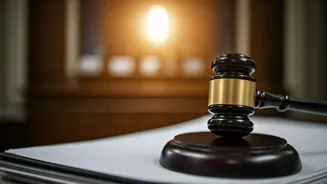Court's Immediate Action
The Supreme Court's intervention has caused a ripple effect in the legal landscape. The court's decision to stay some sections of the Waqf Act marks a critical
turning point, putting specific aspects on hold. This pause allows for careful reevaluation and prevents immediate implementation of those contested parts. The stay means that the law's enforcement is partially halted, creating a temporary period of uncertainty for stakeholders. The courts' actions are not just procedural; they are a sign of deeper legal scrutiny of the act. As a result, this judicial review reflects the court's commitment to ensuring fairness and constitutionality. The stay is a step toward a more cautious and thorough examination of the act, its impact, and its potential implications.
Sections Under Scrutiny
The provisions placed under the stay are those that have generated the most debate and legal challenges. These specific sections are under the microscope because they touch on sensitive issues, potentially impacting land management, property rights, and the administration of waqf properties. The court’s decision to stay these specific sections indicates concerns about their compliance with the constitution or potential for misuse. Because of the stay, the implementation of these problematic sections is suspended until the court delivers a final decision. Legal experts are examining these specific provisions, assessing their legality and impacts, and debating their effects. Public and private stakeholders are evaluating how these legal changes will affect their rights. Further legal battles and interpretations are expected as the court continues its deliberation.
What Remains Enforced
While some parts of the Waqf Act are on hold, many provisions remain in effect. The operative components of the act continue to regulate the administration, management, and oversight of waqf properties. These functioning elements include guidelines for waqf property registration, dispute resolution, and other administrative functions. The continued enforcement means that existing procedures and regulations related to waqf assets continue to apply. This ensures some degree of continuity and stability during the legal proceedings. Legal scholars are carefully scrutinizing the enforced sections, analyzing their effectiveness, and assessing their impact on waqf administration and property management. The ongoing functioning of the remaining sections is essential to maintaining the operation of waqf institutions and properties.
Reactions and Responses
The Supreme Court's interim order on the Waqf Act has garnered various responses. Legal experts, religious organizations, and the public have all shared their perspectives. Some legal professionals have praised the court's stance as a vital measure to ensure the constitutionality of the Act. Religious organizations have provided their interpretations and reactions, often expressing both concerns and support. The public has also weighed in, with diverse opinions emerging. These responses show the importance of the Act and its effect on different communities and interest groups. The ongoing legal cases, media coverage, and public discussions show how vital this issue is. These debates will shape the future of the Waqf Act and its execution.
Future Implications
The Supreme Court's verdict on the Waqf Act has broad ramifications. The outcome of the ongoing court cases will establish legal standards for managing waqf properties and impact property rights. The decision will also affect the balance between religious and secular regulations, determining how religious institutions can function within legal frameworks. The rulings will set precedents for how similar legal matters will be handled in the future, influencing legal interpretation. Furthermore, the court's verdict will impact social discourse and government policies, triggering debates about religious freedom and property rights. It's essential to follow the proceedings to understand these future developments.












